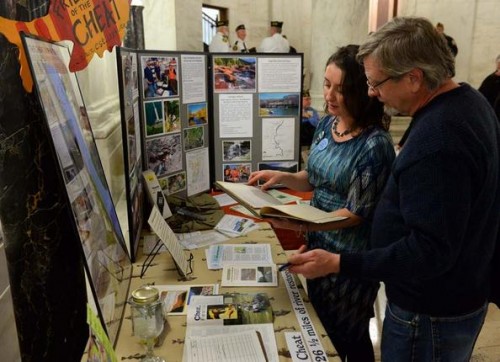
Amanda Pitzer, director of Friends of the Cheat, talks with Charleston resident Paul Dalzell about the quality of the state’s water during the West Virginia Environmental Council’s annual E-Day at the state Capitol.
CHARLESTON, W.Va. — Environmental groups gathered at the state Capitol on Monday, hoping to convince lawmakers that last month’s Elk River chemical spill is proof that major changes are needed in how West Virginia protects its water.
As part of its annual E-Day, West Virginia Environmental Council organizers urged the Legislature to strengthen a chemical storage tank bill and broaden their approach to other water quality and public health issues.
“This is not just about Freedom Industries,” said Angie Rosser, executive director of the West Virginia Rivers Coalition. “It’s about what’s been happening across our state for decades.”
Rosser was among about 100 people from around the state who gathered in the Capitol’s lower rotunda for a press conference and rally, as various full-time lobbyists watched from a floor above.
Among other things, environmentalists said they wanted lawmakers to remove industry-proposed exemptions from the chemical storage tank bill, expand the types of facilities covered by the legislation, and mandate creation of a new chemical accident prevention program recommended by the U.S. Chemical Safety Board.
“The problem is not that one leak from that one tank on the Elk River,” said Jim Kotcon, longtime leader of the West Virginia Sierra Club. “The problem is tank after tank and impoundment after impoundment that are leaking all the time.”
Don Garvin, the environmental council’s lead lobbyist, said he sees some progress with lawmakers.
For example, Garvin said, lawmakers removed a weakened water pollution limit for aluminum — a measure backed by the coal industry and the Department of Environmental Protection — from a bundle of DEP rule changes.
“We raised an issue about weakening the state’s water quality standards,” Garvin said. “No one wanted to be seen as doing that after the chemical spill…”






